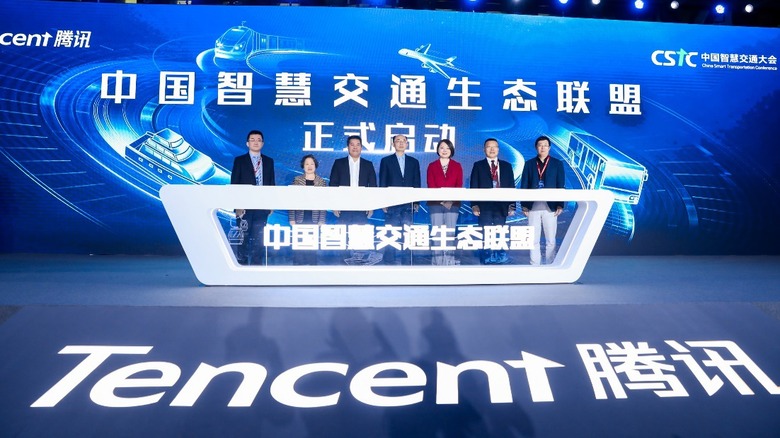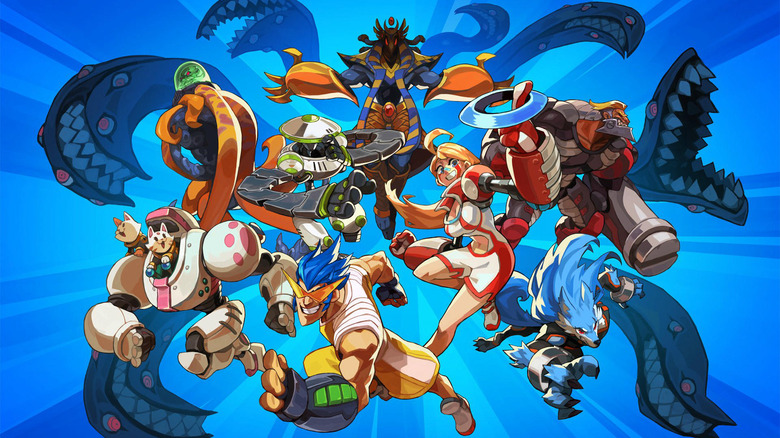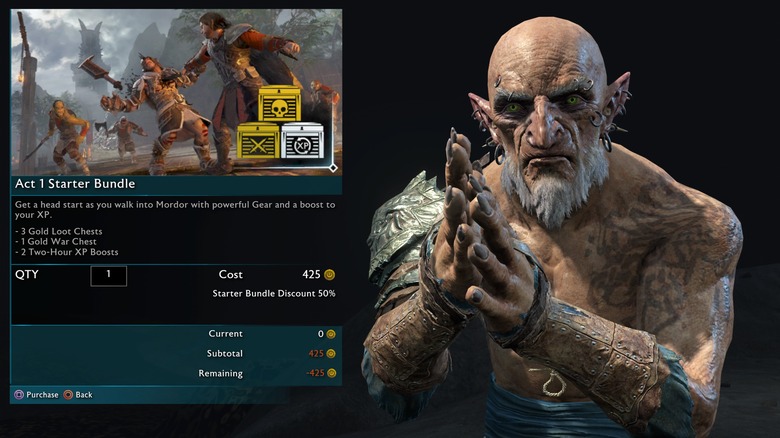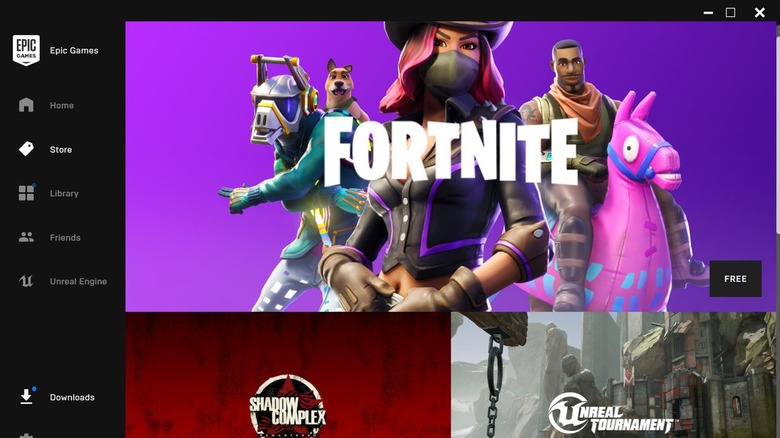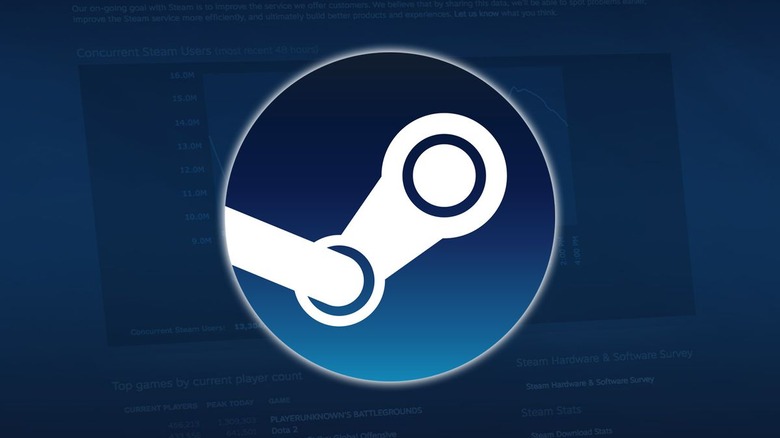The Dark Truth Of The Epic Games Store
As anyone who's actually played Monopoly is aware, nobody wins when one person has a stranglehold on an entire industry. In the case of PC gaming, that one person is, for all intents and purposes, Valve's Gabe Newell. So, when Epic, flushed full of sweet sweet Fortnite money, decided to step up and take a swing at Valve's dominant Steam digital store, most gamers were pretty positive about it. And that positivity lasted approximately five seconds, give or take.
Fast forward some months after the Epic Store's launch, and gamers have come to treat even the mention of the store like the presence of Voldemort, despite Epic doing, on paper, exactly what a competitor should to in order to pose any sort of serious threat. But the facts of the matter don't lie, and there's some very real reasons why folks have come to view the house that Fortnite built with suspicious eyes.
The Tencent problem
To hear Epic tell it, the fact that Chinese megaconglomerate Tencent owns 40% of Epic has no bearing whatsoever on how they conduct business. In theory, that's possible. Epic's CEO, Tim Sweeney, is still the controlling shareholder. But there's what Sweeney says and what the company's done, and those two things paint an iffy picture.
For starters, it's not a great look that immediately after the purchase, several of the folks who had been working on the company's best games moved on to greener pastures. It's not a great look that a company so prolific and diverse in its games catalog, after the purchase, only makes two games: an Oculus-exclusive VR first person shooter called Robo Recall and Fortnite, both of which just happen to fall more under Tencent's wheelhouse of games. It's also probably not an accident that this is exactly what happened after Tencent got involved with both Riot and Ubisoft.
That brings us to the Epic Store. Everything about how Tencent acts with its gaming properties points towards some serious changes once the store's truly established.
The Epic Games Store makes an offer that indie developers can't refuse
The big selling point of the Epic Store from the developer standpoint is that sweet 88% revenue split, compared with Steam's 70%. Now obviously, more money is more money, and that's a selling point no matter who you are. But the Epic Store offers something else far more valuable that Steam either can't or won't: visibility.
Even beyond the other problems with Steam as a platform, the biggest it faces is curation. There's such a glut of content, a majority of which is outright trash, that quality doesn't ever get a chance to rise to the top. Even if Valve did offer a better revenue split, developers wouldn't get seen nearly as much. Epic, by its very nature as the smaller option, can put new games front and center. That's a no-brainer for devs.
But as we're all now aware, bending the knee to Epic means depriving Steam and its users. Anyone active in the Steam community, or with a large group of Steam friends, will just be left out in the cold. Yes, there are some willing to take the high road, but really, the truth of the matter is that every developer has to weigh the pros and cons of taking Epic up on their deal. Even at the expense of annoying a chunk of their fanbase, the smartest move remains reigning in Hell rather than serving in Heaven.
Studios' greed is showing
Here's where things get dicey. An indie developer who has to scrap for every cent they make on a game: yes, absolutely be kind to them for taking Epic's deal. But a AAA developer whose Smaug-like mountain of riches is all but guaranteed, even on Steam, where curation doesn't matter to them as much? It's hard not to see a lot of evil green eyes light up here.
Still, that could be seen as business as usual. What's jarring is watching them fall over themselves to make the jump with absolutely no consideration whatsoever for the playerbase — no warning, no polling, nothing — and having it happen time and time again. That, more than anything, is telling. As many times as publishers have used "player choice" as an excuse for some of the worst parts of gaming of late, seeing how fast the choice is made to deny players that choice is shameful.
There's a AAA double standard at the Epic Games Store
The real kicker is this: as hard and fast as Epic's exclusive policy seems to be on the surface, as it turns out, they're willing to bend that rule depending on the publisher.
Glass Bottom Games is an indie developer making a cool little game called SkateBIRD about, well, skateboarding birds. It actually looks super cute. Epic offered to put the game on their store, provided they pull off of Steam. Seeing as SkateBIRD's Kickstarter already promised Steam codes and they weren't willing to renege on that, they declined. Epic did not allow SkateBIRD on their store.
Cyberpunk 2077, though? Coming out for everything. No problem.
This gives us two equally abhorrent possibilities. Either Epic's exclusivity clause is less about exclusivity than control, or keeping CD Projekt Red happy seems more in their best interests than, say, keeping indie devs happy, which rather undermines the whole idea of the Epic Store as being for their benefit.
Developers are feeling the backlash, and it's Epic's fault
Without a doubt, developers have considered the cost of going Epic exclusive and determined the backlash to be worth it. But make no mistake, there is backlash, and a lot of it, which is making developers' lives absolutely miserable. In fairness, that's the case for pretty much everything in gaming these days. But in this instance, as we've seen, it's a problem that could be easily fixed if Epic would allow developers and their potential playerbases their choice of platform. As we've also seen, that's an option that's a bit too far above most indie developers' pay grades.
Instead, Epic is choosing to bandage the issue. And there isn't really a bigger revenue split that can make this deeply ingrained problem go away for the industry. At bare minimum, though, giving devs the ability to offer more choices for their fans would be the most decent and safe thing.
The Epic Games Store is an inferior product
Here's the real question, though: would we be seeing this much of an outrage if the Epic Store was a product on par with or better than Steam? It's impossible to be certain, of course, but there's a strong case for the answer being no. Console players know this already: exclusives are kind of the bread-and-butter of each generation's console wars, and nobody raises too much fuss because the exclusives typically make the most of their respective platforms. For better or worse, this isn't something PC gamers have had to consider for a long time. Thinking about it solely from the customer side, what is Epic offering that makes it fundamentally better than Steam?
The answer, of course, is nothing. Take a look at this list of planned features. The Epic Store has been out a long while now, and lacks not just a lot of Steam's features, but basic features for literally any online storefront. There still isn't even a Shopping Cart feature, and the company just deleted their original roadmap, so who knows when any of this stuff will actually make it in. From the customer standpoint, sending an exclusive over there is like if a new Tool album could only be played on Zunes.
The Epic Games Store won't make the industry better, just worse
One of the big explanations Epic has trotted out to justify their aggressive attempted stranglehold on the market is that they'll let up if Steam makes changes, which is probably the most darkly cynical and dishonest thing Epic has said this entire time.
Again, when Epic first announced that revenue split, it seemed like the exact kind of thing smaller devs had been waiting for. That part, at least, has ended up delivering as promised. Everything else seems to have had one singular purpose: to starve Valve for content, not help indies.
From a corporate business standpoint, it's hard to even blame Epic. Playing dirty pool to crush your competitors is the cornerstone of good business. But the black irony is that it hasn't even led Epic to that. Aside from some minor annoyance that Epic's been utilizing some of Steam's user data, Valve hasn't even flinched since the store started snatching away exclusives. So for all of Epic's heavy-handed tactics, they haven't even managed to force their competitor to be better. So it's just making the whole situation worse.
Whoever wins, we lose
Ultimately, the only honest conclusion to be drawn is that Epic/Tencent saw an opportunity and, bolstered by Fortnite, used its wealth to grab a crucial portion of Valve's pie. That's gross enough, but there's only one group who's felt the ill effects, and that's gamers.
From the consumer standpoint, the Epic Store sending games to an inferior platform, offering no benefits or discounts or additional features, while the rest of their typically extensive game library sits in an entirely different launcher, is little more than a giant annoyance. That's not worth threatening people's lives or livelihoods, mind you, but it is an annoyance that only ends two ways: Option A, the Epic Store flops, the status quo is restored, and Valve continues to not evolve in any way. Option B, the Epic Store succeeds, and Valve being too big to fail creates a new normal of corporations fighting over exclusives that PC gamers have gotten to avoid all these years. There is no way for anyone who isn't swimming in money to feel good about any of it.


